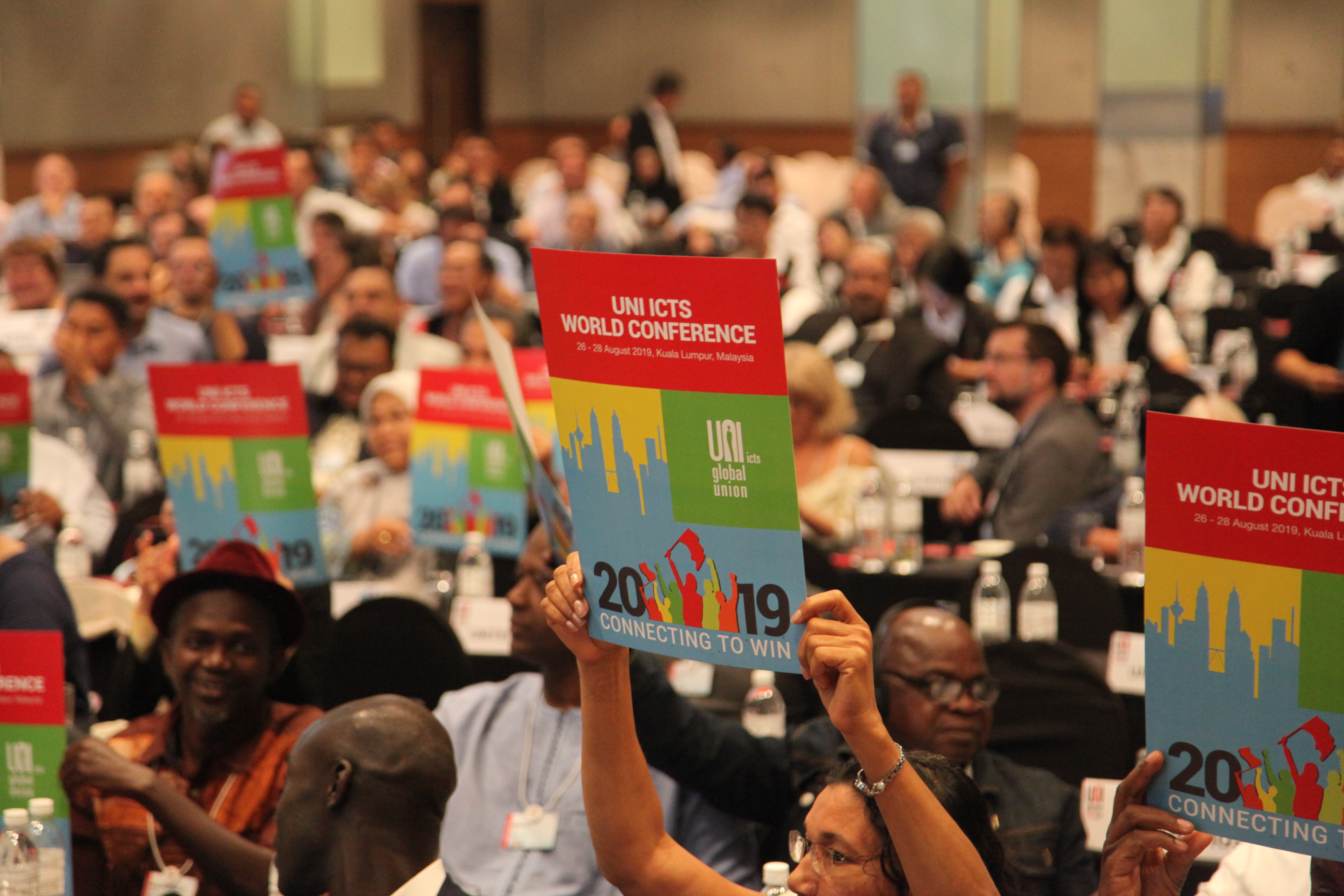News
Contact center worker organizing is making the outsourced economy a fairer one

Contact centers are at the heart of the new world of work and the digital economy. These jobs are often driven by globalization; they are the front edge of outsourcing; and they are increasingly serving the world’s largest tech companies like Apple, Amazon, and Uber.
The UNI ICTS world conference “Connecting to Win” highlighted the movement to organize contact center workers globally.
Much of the discussion focused on Teleperformance, the world’s largest contact center company, where UNI has helped coordinate an alliance of unions from 11 countries. Case studies from the Dominican Republic, Albania, and Tunisia showed how organizing this industry is an exercise in cross-border solidarity and dogged on-the-ground organizing.
“At Teleperformance, we are seeing how hard it is to help workers organize, but yet we are making progress through unions relationships with clients, through international unity, and through the determination of workers on a local level,” said Christy Hoffman, General Secretary of UNI Global Union.
Teleperformance’s operations in the Dominican Republic is primarily for the U.S. market, and U.S. telecoms company AT&T is a major client there. When Teleperformance employees’ efforts to organize with SITRATEL-FEDOTRAZONAS were met with harassment and intimidation, the Communications Workers of America (CWA) showed support.
The CWA communicated directly with AT&T about the poor treatment of the Teleperformance employees serving AT&T customers and educated their membership through solidarity missions and social media activity.
The international support, along with excellent local organizing, helped SITRATEL-FEDOTRAZONAS reach a ground-breaking agreement with Teleperformance, allowing workers to form a union free from fear. The union has now gained 1,000 members and represents a majority of employees at the company.
“We succeeded in forming a trade union, even though the company was against it, because we had a solid committee of workers who refused to give up, and we had international support,” said Ygnacio Hernandez, President of the FEDOTRAZONAS labour federation to which SITRATEL belongs. “That support kept us going, and since most of our clients are from the United States, the support we got from the CWA and the Teleperformance Union Alliance helped make the difference.”
In Albania, the contact center industry there employs roughly 7 percent of formalized workforce—or 30,000 workers—and primarily serves the Italian market. Teleperformance is the largest contact center employer in the country.
When the National Union of Contact Centers, or “Solidarity” (Sindikata Kombëtare e Qendrave të Kontaktit, “Solidariteti”), formally launched the union in February 2019, delegations from Italian telecommunications unions SLC-CGIL and FISTEL-CISL were at the kick-off.
“We believe the support from the Italian unions and Italian clients has prevented Teleperformance from much of the harassment of leaders,” said Bora Mena, an organizer with Solidarity.
Solidarity has continued to organize contact center workers throughout the sector, and after months of delay from the government, their union was recognized by the courts last month.
Ali Ourak, of the Tunisian union UGTT, described how his union used a conflict with Teleperformance to build the union’s power.
“In 2013, the company was engaged in social dumping. They tried to lower our salaries and fired 24 union activists,” Ourak said.
The union engaged in a four-month conflict in which there were three strikes, a 55 day sit-in, and a nine day hunger strike. The union also set up an action committee that continues to this day.
The UGTT won the strike and how has more than 4,000 members at Teleperformance in Tunisia.
“Companies like Teleperformance have a global strategy to squeeze their workforce to maximize their profit,” said Benjamin Parton, UNI ICTS senior organizer. “But there is a global pushback against that. Contact center workers are uniting to demand that their rights be respected, that they get paid what they’ve earned, and that they have respect on the job.”

